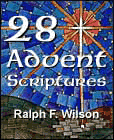Free E-Mail
Bible Studies
Beginning the Journey (for new Christians). en Español
Old Testament
Abraham
Jacob
Moses
Joshua
Gideon
David, Life of
Elijah
Psalms
Songs of Ascent
(Ps 120-135)
Isaiah
Advent/Messianic Scriptures
Daniel
Rebuild & Renew: Post-Exilic Books
Gospels
Christmas Incarnation
(Mt, Lk)
Sermon on the Mount
(Mt 5-7)
Mark
Luke's
Gospel
John's Gospel
7 Last Words of Christ
Parables
Jesus and the Kingdom
Resurrection
Acts
The Early Church
(Acts 1-12)
Apostle Paul
(Acts 12-28)
Paul's Epistles
Christ Powered Life (Rom 5-8)
1 Corinthians
2 Corinthians
Galatians
Ephesians
Vision for Church
(Eph)
Philippians
Colossians,
Philemon
1
& 2 Thessalonians
1 & 2 Timothy,
Titus
General Epistles
Hebrews
James
1 Peter
2 Peter, Jude
1, 2, and 3 John
Revelation
Revelation
Conquering Lamb of Revelation
Topical
Glorious Kingdom, The
Grace
Great Prayers
Holy Spirit, Disciple's Guide
Lamb of God
Listening for God's Voice
Lord's Supper
Names of God
Names of Jesus
Christian Art
About Us
Speaking
Contact Us
Dr. Wilson's Books
Donations
Watercolors
Sitemap
Day 3. Christ Comes to His Rightful Kingdom (Genesis 49:10)
Tuesday, First Week of Advent
 'The Lion of Judah' is mentioned in Jacob's blessing of his son Judah, from whom Christ descends. Lion panel detail of 'Resurrection Window' (2017) by Judson Studios, Narcissus Quagliata, artist, United Methodist Church of the Resurrection, Leawood, Kansas. Fused stained glass. |
We'll leave the advent narrative for a few days as we go back in the Scriptures to some of the first hints of the coming of the Messiah.
Reading: Genesis 49:8-12
Jacob is old and ill. He blesses Joseph's sons, Ephraim and Manasseh (Genesis 48) and then calls for his other sons to come to his bedside. In a weak voice he says,
"Gather yourselves together, that I may tell you what shall happen to you in days to come." (Genesis 49:1)
In this context of prophecy over each of the twelve sons of Jacob we find what I would call the earliest clearly messianic prophecy.10
He blesses each son in turn, starting with the oldest. The prophetic blessings are brief, but when he comes to his fourth-born, Judah -- the tribe from which Jesus descends -- his prophecy is substantially longer.
The Lion of Judah (Genesis 49:9; Revelation 5:5)
Judah is characterized as a lion and a lion's cub, then a lioness who crouches, "who dares to rouse him?" Judah is powerful and a tribe to be reckoned with. In the first book of the Bible, Judah's tribe is symbolized by a lion; in the last book of the Bible we read of Judah's offspring:
"See, the Lion of the tribe of Judah,
the Root of David, has triumphed." (Revelation 5:5)
Christ, the Lion of Judah, shall break every chain!
The Scepter, the Ruler's Staff (Genesis 49:10a-b)
I want to focus, however, on verse 10.
"The scepter will not depart from Judah,
nor the ruler's staff from between his feet,
until he comes to whom it belongs
and the obedience of the nations is his." (Genesis 49:10, NIV)
The prophecy speaks of a future descendant of Judah who will reign in fulfillment of this prophecy.11 The prophecy focuses on the scepter, the ruler's staff, the symbol of rule, that this future ruler will bear.12
Until He Comes to Whom It Belongs (Genesis 49:10c)
The third line, is variously translated:13
"Until Shiloh come." (KJV, NASB, following the Hebrew Masoretic text).14
"Until tribute comes to him." (ESV, NRSV, NJB), emending the text slightly.15
There is good reason, I believe, to render this phrase as it was understood in very early translations (Syriac and Septuagint), by the Qumran community, and in some Targums.16
"Until he comes to whom it belongs." (NIV, RSV)17
After a lengthy discussion of the various alternatives, evangelical Hebrew scholar Victor Hamilton renders it, "Until he possess that which belongs to him."18 I think he's right.
I'm sure the prophecy refers initially to David, the first of Israel's rulers to arise from the tribe of Judah. But, even more, the prophecy points to David's ultimate descendent -- Jesus Christ -- born in David's hometown of Bethlehem because Joseph "was of the house and lineage of David" (Luke 2:4). And so generation after generation, king after king -- even at a time when there was no king of Judah after the Exile -- even then, the authority to reign will not pass from the line of Judah, "until He comes to whom it belongs" -- Jesus Messiah!
The Obedience of the Nations (Genesis 49:10d)
The fourth line of the verse must not be forgotten:
"... and the obedience of the nations is his." (Genesis 49:10d, NIV)
Obedience is hard. It requires humility, submission. Jesus' own Jewish people would not acknowledge him.
"He came to his own, and his own people did not receive him. 'But to all who did receive him, who believed in his name, he gave the right to become children of God." (John 1:11-12)
Christ is not just the Jews' Messiah. He is more. By virtue of office the Messiah is entitled not only to the obedience19 of the Israelite people, but to the "nations" (NIV), "the peoples" (ESV, NRSV, KJV),20 all the sons of Adam. You and I. He is the One before whom:
 Also available in book formats: PDF, Kindle, and paperback. |
"Every knee
should bow,
in heaven and on earth and under the earth,
and every tongue confess that Jesus Christ is Lord,
to the glory of God the Father." (Philippians 2:10-11)
Do you believe in him? Good. Do you obey him? That is the question you must answer this Advent season.
Prayer
Father, thank you for fulfilling your promise of a Messiah from the tribe of Judah, given through your servant Jacob. Thank you that Jesus has come to the Rulership that is his by birth and divine anointing. Quell my rebellious heart and help me to love and obey him as my Messiah. In his holy name, I pray. Amen.
Discussion Question
Q3. (Genesis 49:10) What does the image of a lion tell
us about Judah's descendant? How does Jesus qualify for the promise of the
ruling scepter? Why is obedience so hard for us? Why is it so important for us?
https://www.joyfulheart.com/forums/topic/2077-q3-king/
Endnotes
[10] Some see Genesis 3:15 as a prophecy of Christ, "He [the serpent] shall bruise your head, and you [your offspring] shall bruise his heel" (Genesis 3:15). Certainly in retrospect we can see how Jesus conquering Satan fulfills this prophecy (called the Protoevangelium, "the first gospel"), but it hardly speaks of a Davidic messiah.
[11] "Until" is the preposition 'ad, found in poetic passages, "as far as, even to, up to, until, while," here a preposition of time, "even to, until" (BDB 723, 2a(a)). "Comes" is the Qal imperfect of the very common verb bôʾ, "go, arrive, enter" (TWOT #212).
[12] "Scepter" is shēbeṭ, "rod, staff." The word is of a rod as a weapon, for beating cumin, tribe, and as an instrument for discipline and corporal punishment. Here it is used as a mark of authority carried by a ruler (Amos 1:5; Zechariah 10:11). A related word (sharbît) is used in Esther of the king's scepter (Esther 4:11; 5:2 twice; 8:4) (Bruce K. Waltke, TWOT #2314a). "Ruler's staff" (ESV, NIV, NRSV, NASB, NJB), "lawgiver" (KJV) is the Poel participle of ḥāqaq, "engrave, portray, decree, inscribe, govern." The root refers to enacting a decree. The root may also parallel shēbeṭ ("staff") designating the ruler's staff which is the symbol of ruling" (Numbers 21:18; Psalm 60:7; 108:8). A fragment from the Dead Sea Scrolls quotes this verse and applies it to "the coming of the legitimately anointed (king), the scion of David" for whom they hoped (T. H. Gaster, The Dead Sea Scriptures (rev. ed., Doubleday, 1964), p. 334; Jack P. Lewis, TWOT #728).
[13] Victor P. Hamilton notes: "This line has provoked more difference of opinion among Hebraists than perhaps any other in the entire book of Genesis" (The Book of Genesis, Chapters 18-50 (New International Commentary on the Old Testament [NICOT]; Eerdmans, 1995), p. 654f, fn. 12).
[14] The problem with "until Shiloh come(s)" is that the meaning is quite unclear, since Shiloh is a place-name in the Old Testament, a village in the territory of the tribe of Ephraim where the tabernacle resided. Or perhaps it could be understood as, "Until he (Judah/David) comes to Shiloh," expressing some expansion of the base of power beyond Judaean borders, or perhaps "until a man of Shiloh comes," but this has no textual support (Victor P. Hamilton, TWOT #2376; Hamilton, Genesis 18-50, NICOT, p. 659).
[15] This interpretation involves dividing the consonantal text shylh into shay lô, "until tribute is brought to him"; so Ephraim A. Speiser, Genesis (Anchor Bible Commentary, Vol 1; Doubleday, 1964).
[16] A targum was an originally spoken translation of the Hebrew Bible that a professional translator would give in the common language of the listeners when that was not Hebrew.
[17] The Septuagint renders it "until there come the things stored up for him." This translation infers a slight change in the Masoretic text, of shylh to shlh ( = shellô "to whom it belongs"), the relative particle sh, the preposition le. the third person singular pronominal suffix ô, "to him." The Qumran community understood it this way (4 QPBless). The similarity to Ezekiel 21:27 is striking (Victor P. Hamilton, TWOT #2376).
[18] Hamilton, Genesis 18-50 (NICOT), p. 654).
[19] "Obedience" (NIV, ESV, NRSV), "gathering" (KJV) is yeqāhâ or yiqhâ, "obedience," used only twice in the Old Testament, here and in Proverbs 30:17 (Paul R. Gilchrist, TWOT #902a). Hamilton notes that the Arabic cognate waqhat, "obedience" puts the meaning "beyond doubt" (Hamilton, Genesis 18-50 (NICOT), p. 655, fn. 13).
[20] Plural of ʿam, "people, nation. Von Groningen notes, "Although there is some overlapping in meaning with its two main synonyms gôy and le'ōm, the unique emphasis of ʿam lies in its reference to a group of 'people as viewed by one of themselves,' or to 'people in general'" (Gerard Von Groningen, TWOT #1640a).
Copyright © 2024, Ralph F. Wilson. <pastor![]() joyfulheart.com> All rights reserved. A single copy of this article is free. Do not put this on a website. See legal, copyright, and reprint information.
joyfulheart.com> All rights reserved. A single copy of this article is free. Do not put this on a website. See legal, copyright, and reprint information.
 |

|
In-depth Bible study books
You can purchase one of Dr. Wilson's complete Bible studies in PDF, Kindle, or paperback format -- currently 48 books in the JesusWalk Bible Study Series.
Old Testament
- Abraham, Faith of
- Jacob, Life of
- Moses the Reluctant Leader
- Joshua
- Gideon
- David, Life of
- Elijah
- Psalms
- Solomon
- Songs of Ascent (Psalms 120-134)
- Isaiah
- 28 Advent Scriptures (Messianic)
- Daniel
- Rebuild & Renew: Post-Exilic Books
Gospels
- Christmas Incarnation (Mt, Lk)
- Sermon on the Mount (Mt 5-7)
- Luke's Gospel
- John's Gospel
- Seven Last Words of Christ
- Parables
- Jesus and the Kingdom of God
- Resurrection and Easter Faith
Acts
Pauline Epistles
- Romans 5-8 (Christ-Powered Life)
- 1 Corinthians
- 2 Corinthians
- Galatians
- Ephesians
- Philippians
- Colossians, Philemon
- 1 & 2 Thessalonians
- 1 &2 Timothy, Titus
General Epistles
Revelation
Topical
